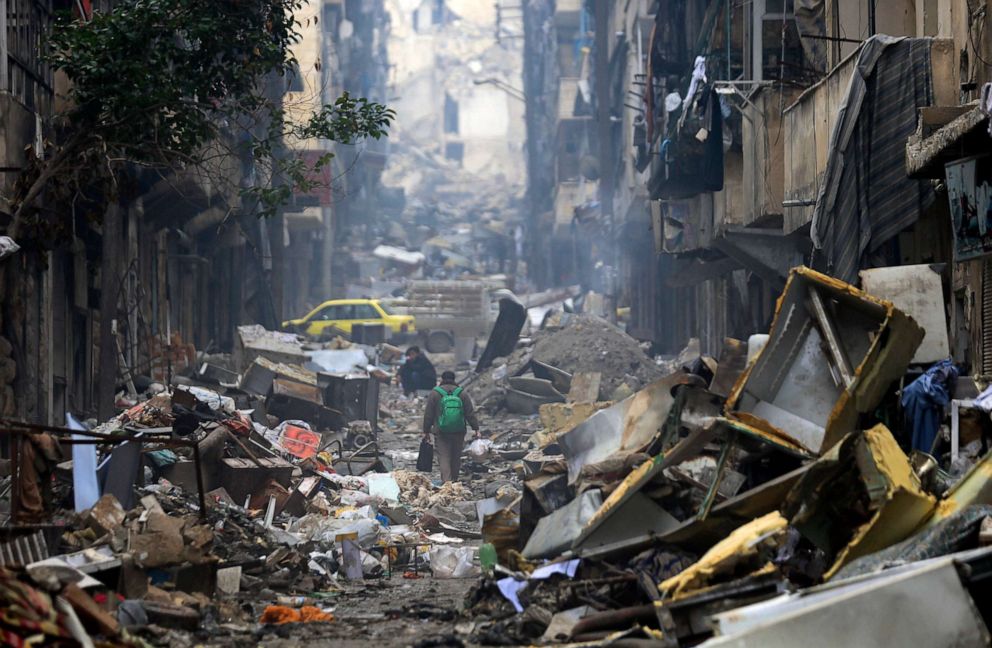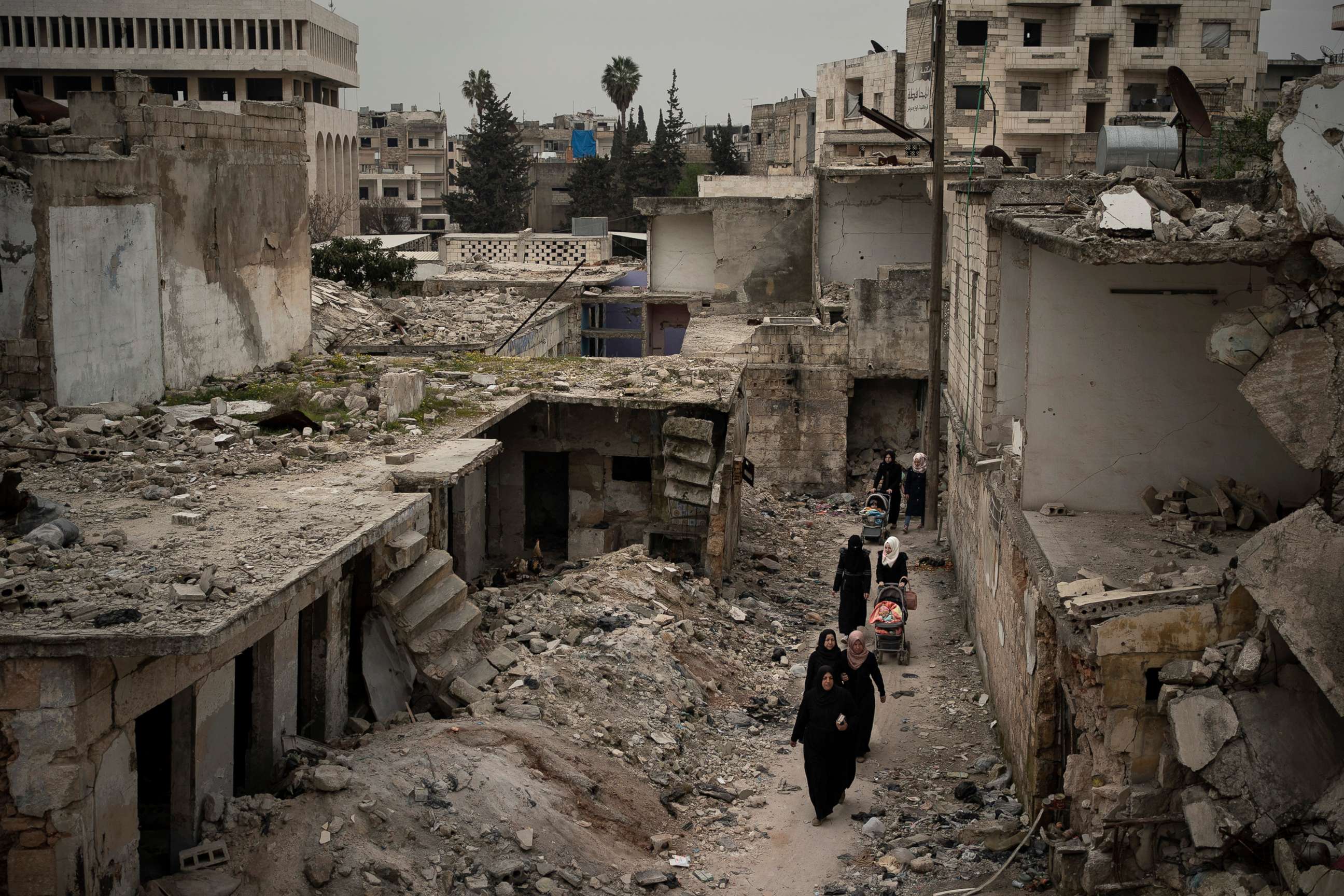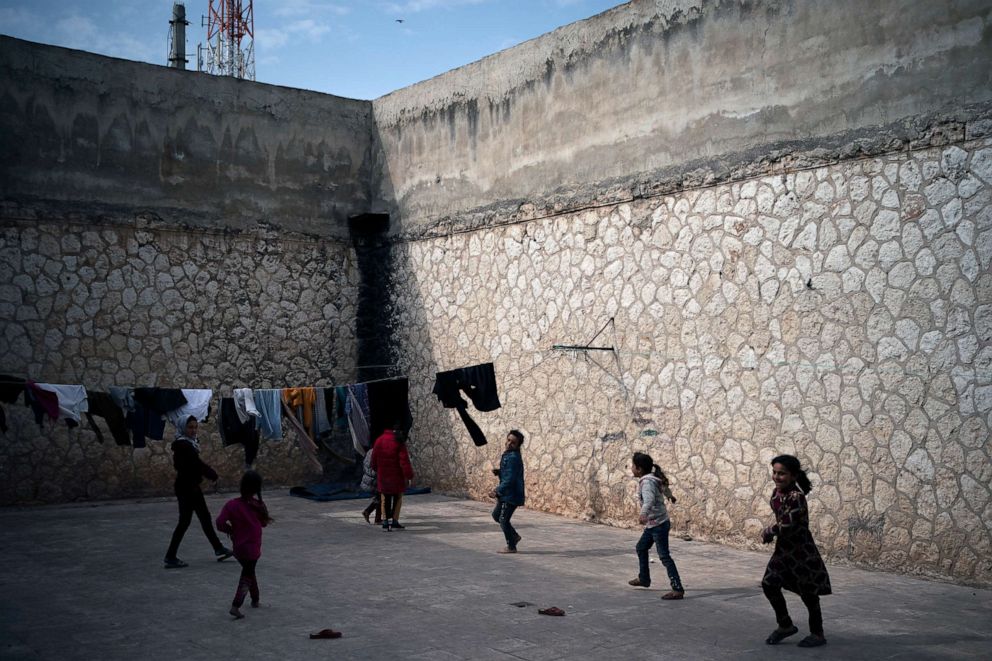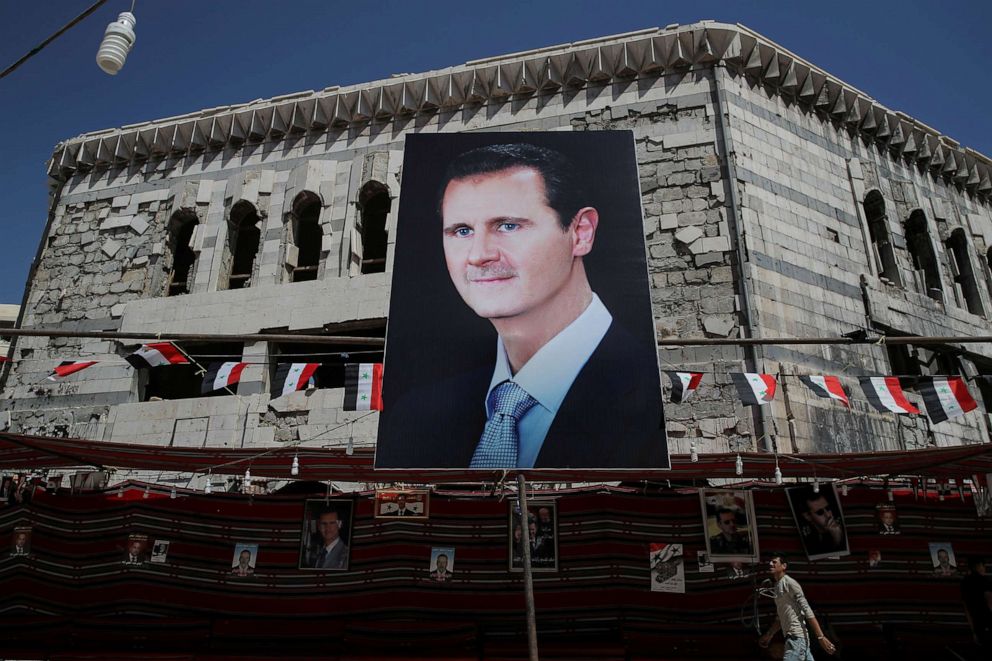10 years into Syrian civil war, warning of 'catastrophic' conditions in last rebel stronghold of Idlib
Hundreds of thousands have died in the decade-long conflict.
LONDON -- A little over a year ago, 10 schools were hit with air and artillery attacks in northwest Syria, on just one day near the city of Idlib, the last major rebel stronghold in the country.
Four children died that day and many others were injured, according to Hurras Network, a nongovernmental organization that focusses on child protection in Syria. Four teachers were killed and three others injured, they said.
“I saw everything go dark,” one of the children, 8-year-old Nadia (not her real name), said in testimony shared by Hurras with ABC News. Like millions of others, her family was displaced by Syria’s devastating decade-long civil war, and now live in Idlib.
The continuing bombings of schools a decade after hostilities began are just a snapshot of life inside the embattled province. Doctors and aid workers inside the 21st century’s bloodiest civil war warn that the situation is “catastrophic.”

According to the UN, there are 6.2 million internally displaced people in Syria, the highest total in the world, with 5.6 million refugees living abroad. The mass displacement, which amounts to around half the pre-war population, has been described by the UN as the "biggest refugee crisis of our time."
The Paris-based Syrian Network for Human Rights (SNHR) has SNHR, 227,413 Syrian civilians have been killed. Just over 200,000 of those deaths -- around 88% -- were killed by Syrian regime forces they said, with a further 149,361 individuals currently detained or having been "forcibly disappeared," they said.
14,506 of those died by torture, SNHR say, as part of the Assad regime's brutal police state, which rounded up perceived dissidents from within as well as relentlessly bombarding cities such as Aleppo that were under rebel control.
A report from the Syrian Observatory for Human Rights, the total number of dead, including combatants, could be as high as 594,000.
Experts say that a series of stops and starts by the U.S. and U.K. and the intervention of foreign powers like Russia and Turkey have allowed President Bashar al-Assad's brutal regime to take hold and for atrocities to continue.

‘Gigantic human tragedy’
In March 2011, protests erupted over the detainment of a group of boys who had painted anti-government graffiti at their school. A violent crackdown from the authorities ensued, and the protests quickly spread around the country, morphing into a rebellion against the rule of President Bashar al-Assad, the country’s lifelong dictator.
Now, just a northeastern area controlled by Syrian Kurdish forces and the northwestern province around the city of Idlib and surrounding province holds out against the Assad regime.
Initially considered to be a potential reformer, al-Assad cracked down on opposition parties, journalists and human rights campaigners. After the initial flashpoint in March 2011, protests spread around the country, and with it a crackdown by the Syrian forces.
The potential revolution became a full-blown civil war in 2012, the international community watched on as stories of human rights abuses began to emerge.
Throughout the conflict, there have been a multitude of reports that the Assad regime had used chemical weapons on civilian targets, as well as repeatedly targeted hospitals in rebel-held areas.
According to SNHR, Syrian regime forces have carried out 217 chemical weapons attacks between December 2012 and March 2021.
Through long and bloody fighting across the country, the Islamic State in Iraq and the Levant (ISIL), entered the picture. In January 2014, they overran the city of Raqqa, which became one of their capitals, and declared a self-styled “caliphate,” with founder of the group Abu Bakr Al-Baghdadi as their ruler, in June of that year. At the height of their power, the group was estimated to be in control of one third of Syria and neighboring Iraq.
More than half of the country has experienced a change in power as fighting continued between the Syrian government, backed by Iran and Russia, and various rebel and Islamist groups, according to the Carter Center, an NGO founded by former President Jimmy Carter, that has tracked the conflict since it began.
“The Obama administration came into office greatly influenced by the American bitter experience in the war in Iraq, and it did not look at the Libya experience as particularly successful either and so it was very unwilling to commit great resources to the Syria conflict,” said Former U.S. Ambassador to Syria, Robert Ford, who served under President Obama.
“It quickly became apparent that there was a very big disparity between the Obama administration's rhetoric [and what they were willing to do], including statements that Assad must go,” he continued.
That, according to Ford, gave al-Assad “greater confidence to be intransigent” and refuse entering into negotiations with rebel groups, while increasingly backed by the military might of Russia and Iran. After 10 years, he said, the conflict struck him as a "gigantic human tragedy."
Inside Idlib’s ‘catastrophic’ situation
Inside Idlib, the conditions are bleak.
Dr Tarraf Altarraf, a physician at a hospital in Idlib, which cannot be identified for security reasons, said that Russian and Syrian government forces targeting hospitals and medical facilities is “systemic.” There have been at least 863 recorded attacks on medical facilities during the conflict, SNHR say.
"As a doctor, I witnessed many massacres and I lost many, many of my friends and loved ones, we used to see dozens of casualties due to aerial bombardment," he told ABC News in a recent video interview. "Generally, the situation in the hospital is catastrophic. There is a huge lack in medical equipment and the human resources."

“I call on America and on to Britain to play a more proactive role in ending the now 10-year-old Syrian tragedy,” he said. “I believe that much more could have and should have been done.”
And it’s not just hospitals that have been targeted. The SNHR says that over 1,500 educational facilities have been damaged or attacked since the civil war broke out.
ABC News was granted access inside a school in Idlib, which cannot be named for security reasons, to see the early warning systems now in place -- similar to those in other countries to deal with natural disasters -- to help protect children during bombing raids.
Advocates say those systems could gain crucial minutes for children to escape to safety.
“We have followed all the protocols, mechanisms, systems, and procedures... and that day 10 schools were attacked and we couldn’t protect four children who lost their lives,” said Layla Hasso, an advocacy manager at Hurras Network. “Today there is hope. Installing an early warning system inside the school will give children an average of 7-10 crucial minutes of warning before the bombs land.”
The population around Idlib is caught between an active conflict zone in the south, and a border to the north which is closed, Joel Ghazi, Doctors Without Borders project coordinator for northwestern Syria, told ABC News. Increasingly, he said, the coronavirus pandemic has hampered their ability to carry out vital aid work.

“Most camp residents rely on aid,” he said. “It's not enough. Some of them rely on money sent by their relatives outside Syria. But with the economic impact of COVID as well, it has impacted relatives outside of Syria.”
Ford said the U.S.'s uneven commitment to the situation in Syria has “diminished America’s credibility” in terms of “expecting Americans would intervene military on behalf of their demands for better government." Ten years of conflict and Western sanctions have seen the economy deteriorate. Any hopes of a democratic future, envisaged by so many at the start of the Revolution, have been extinguished, he said.
President Biden is yet to make a public announcement on his Syria policy since taking office.
“With respect to Syria itself, I am not at all hopeful,” Ford reflected. “Bashar al-Assad has maintained his seat on power in his terms, maintaining power in his terms. He has won and he is not going to be removed. He's going to win a sham election later this spring and he will be there for at least seven more years. There is no clearly identified opposition figure to challenge him within the regime itself. There is no clearly identified challenger against him.”
“It's infuriating at the same time that it's tragic," he said.




